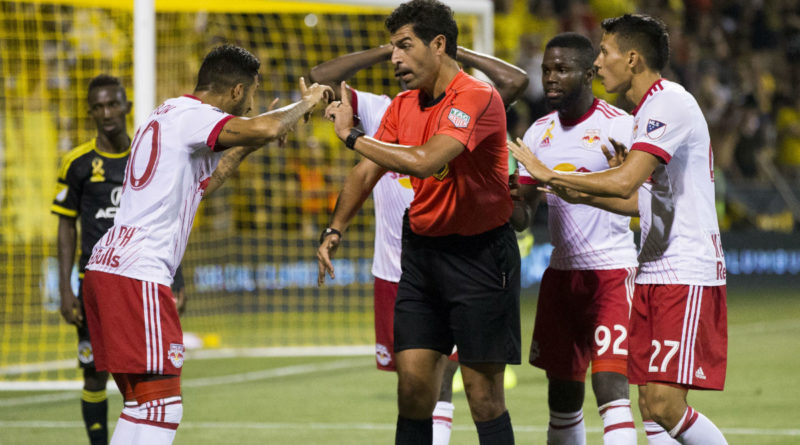Play of the Week 29: Law Change – Fouls off the field of play
There were an unprecedented number of law changes that were applicable at the start of the MLS season, when it got under way back in March 2017. As our season starts later than most other major leagues in the world, we had seen, in various competitions, many issues in relation to the implementation of these changes.
Therefore we invited David Elleray, Technical Director of the International Football Association Board (IFAB), who are responsible for the Laws of the Game and any amendments or changes, to our main preseason camp to go through the changes and offer advice and guidance on the practical application of the law changes.
We also invited EPL and World Cup Final official Darren Cann to one of our subsequent camps to guide us through his experiences implementing the law changes as a practitioner.
In being so well prepared in MLS, we have not seen the issues and problems that occurred in many other leagues around the world.
This week we saw one of the new law changes implemented in the game between Columbus Crew and New York Red Bulls, namely “fouls off the field of play”. Prior to the law change, any foul that occurred off the field during live play did not qualify as a foul. The law previously stated that the offence had to occur on the field of play.
Therefore, instead of giving a free-kick the referee could only order a drop ball restart. The IFAB felt that this was not fair to the offended team, hence the change. The law now states:
“Restart of play after fouls or misconduct
If, when the ball is in play:
– A player commits an offense against a match official or an opposing player, substitute, substituted or sent off player, or team official outside the field of play or;
– A substitute, substituted or sent off player, or team official commits an offense against, or interferes with, an opposing player or match official outside the field of play,
play is restarted with a free kick on the boundary line nearest to where the offence/interference occurred: a penalty kick is awarded if this is a direct free kick offense within the offender’s penalty area.”
In this play, we see a foul take place behind the goal line by Crew’s Jonathan Mensah on Red Bulls’ Gonzalo Veron. Referee Fotis Bazakos initially does not penalize the offense but he is advised by the Video Assistant Referee (VAR) Edvin Jurisevic to review the play. Bazakos goes over to the Referee Review Area (RRA) to look at the incident and correctly awards a PK to Red Bulls. Remember, the referee always makes the final decision.
In this play, you can see the referee moving to create a better angle for himself. In real time, even with a clear view, from their one angle of play, referees do not always make the correct call. Often this is because they are not in the optimum position, however on this occasion that is not the case.
At first viewing, Bazakos feels as though Veron perhaps slips under minimal contact. On further examination in the RRA, looking at the various angles, zooming in and using slow-motion replays, he sees that Mensah makes contact with his arm, which caused Veron to fall. This is a good example of the effectiveness of Video Review to arrive at the correct decision.
This also shows the importance of referees having a thorough knowledge of the Laws of the Game and keeping abreast of any changes. There can never be any excuse for a referee not knowing the law, and in this case, the new law change was applied and the correct decision was made.

